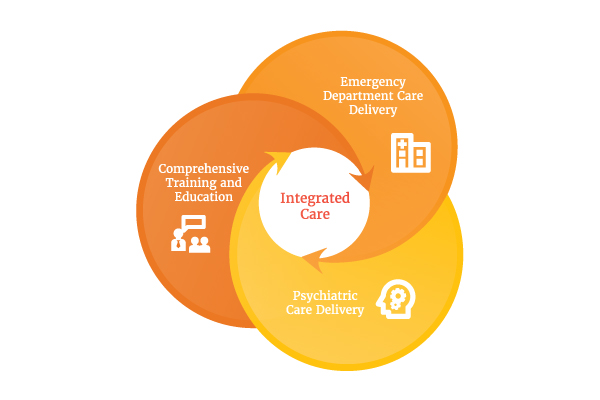How Emergency Psychiatric Intervention Works
At its core, the EPI approach includes expertise and proven results in three areas:
- Elimination of over-processing
- Risk stratification and split flow processing
- Early and appropriate medication management
These three principles are already embedded in the standard processes that serve patients with medical complaints in the ED. However, they have not been successfully applied to the behavioral health population. Through the elimination of unnecessary roadblocks to expedite treatment, patients receive earlier assessments and differentiated care based on diagnosed need. Also, EPI creates core efficiencies to assess, evaluate, and treat behavioral health patients, reducing redundancies and freeing up time to care for more patients. All of this is achieved through a comprehensive education program and toolkit on behavioral healthcare best practices that minimize patient holding and improve care quality and patient experience.
Emergency Psychiatric Intervention at CommonSpirit Health
CommonSpirit Health is the largest Catholic health system and second-largest nonprofit hospital system in the U.S., operating 137 hospitals in 21 states. Like health systems across the country, CommonSpirit was experiencing a rapid increase in the number of behavioral health patients presenting to its ED. Perhaps its greatest challenge was lack of clinician training around mental health and substance abuse emergencies.
Senior Vice President for Behavioral Health Paul Rains, MSN, collaborated with Vituity to identify nine exemplar CommonSpirit EDs in Nevada and California that could not only succeed with EPI but also help to scale it across the organization. This resulted in numerous improvements across the nine participating hospitals within six months:
- Door-to-medication times decreased from 158 to 44.5 minutes, and the percentage of patients receiving medications within an hour nearly doubled.
- Use of first-generation antipsychotics decreased by 79% in favor of newer, less disorienting medications.
- Length of stay for behavioral health patients dropped by 21 minutes while volumes for this population remained constant.
- 34% of ED team members reported increased confidence in taking care of behavioral health patients and 82% reported a decrease in restraint use.
Transforming the ED for All Stakeholders
The impact of effectively and compassionately serving all ED patients, including those with behavioral health conditions, is profound.
- Hospitals and health systems improve clinical quality, profitability, and patient scores while elevating their brand
- EDs achieve higher throughput and better care for all, with fewer behavioral patient admissions and more stable, engaged staff
- Providers gain new confidence in their ability to heal, rekindling the joy of practicing medicine
- All patients know on a very human level that they're properly cared for with dignity and respect
To learn more about how to incorporate EPI at your practice location or health system, contact [email protected].
Originally published April 8, 2021























